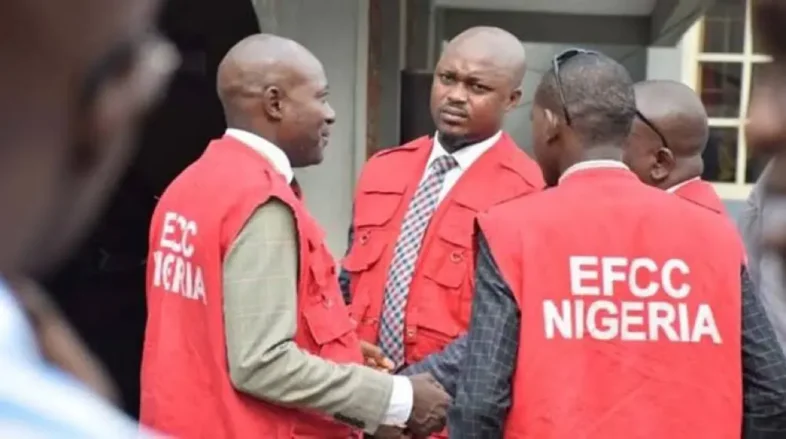An EFCC prosecution witness in the ongoing trial of Chinese national Xiao Hong Will has revealed shocking details of how he and other Nigerian youths were allegedly recruited to carry out cyber fraud under coercion.
Testifying before Justice D.I. Dipeolu of the Federal High Court in Ikoyi, Lagos, on Friday, February 7, 2025, Rowland Turaki, a cyber security student, narrated how his employers instructed him to impersonate a woman to gain the trust of clients.
“I met him at the office, where we work. He is one of our employers. Sometime in mid-November, I was on Jiji.ng looking for a laptop for my cybersecurity studies, so I saw an advert of a job opening for a Customer Service representative role at a company, and the pay was 250k. I clicked on the ad and I was directed to a page with a WhatsApp number, which I was asked to message. I messaged the number and I was added to the group,” Turaki recounted.
The defendant, Xiao Hong Will, was among 792 alleged cryptocurrency investment and romance fraud suspects arrested during the Economic and Financial Crimes Commission’s (EFCC) surprise operation, “Eagle Flush,” on December 19, 2024.
He was arraigned on January 31, 2025, alongside Genting International Company Limited on charges of cyber terrorism, cyber fraud, identity theft, and possession of fraudulent documents.
One of the charges reads: “XIAO HONG WILL and GENTING INTERNATIONAL CO. LIMITED, on or about the 18th of December 2024 in Lagos, within the jurisdiction of this Honorable Court, willfully caused to be accessed, computer systems organised to seriously destabilise the constitutional structure of Nigeria (which prohibits and prevents cyber and related crimes) when you procured/employed Nigerian youths for identity theft and to hold themselves out as persons of foreign nationality, with the intent to gain financial advantage for yourselves and you thereby committed an offence contrary to and punishable under Section 18 and 27 of the Cybercrimes (Prohibition, Prevention, Etc) Act, 2015 (As Amended, 2024).”
Will pleaded “not guilty” to the charges.
Continuing his testimony, Turaki detailed his experience at the company after being recruited. He explained how he was required to undergo minimal screening before being hired and immediately put through training to memorize scripts for interacting with unsuspecting clients.
“On getting to work, I was given a script and some information needed as a guideline for my role in the company. My employers told me I had to memorise all that I was given as a guideline for my new role. For the next three days, I was made to study the script, which I will use to speak to clients,” he said.
“I was to present myself as a woman to gain the client’s trust. I was told not to deviate from the template and adhere strictly to it. After three days of training, they provided me with a desktop computer. We were given numbers to contact. We had a time duration of five days to gain the client’s trust, using the template provided. I started chatting with multiple people, mostly men from European countries.”
He also revealed that the company assigned a model named Amity Smith to provide photos and videos, making their fake identities more believable.
“The name of the model assigned to me is Amity Smith. The job of the model was to gain complete trust of the client. Once this has been done, and trust gained, my employers will send a message on the Telegram group and tell us to hand off, and they take over from us. We stop chatting with the client and move on to the next. Our supervisors are Chinese. I received payment for the duration of my stay, via a bank transfer.”
Turaki further described the high-security environment at the company’s premises, which prevented employees from easily leaving.
“My employer had armed police presence in the work and accommodation premises. Based on the pressure from my employers, I didn’t think it was wise to flee given the high level of security presence at the premises, and I wanted to get paid.
“I wanted to get medication at a time, but the Chinese people told the security men not to let us go.
“When they saw that we were creating a scene, they told the security men to forcefully send us back. We were mostly youths of age 20 to 30. They threatened us, and it contributed to my decision to leave. Unfortunately, the EFCC arrested us before I could do that.”
Despite the defense counsel’s attempt to delay proceedings, Justice Dipeolu ruled that the trial would proceed as scheduled.
The court has adjourned the case until March 18, 2025, for the continuation of trial.











